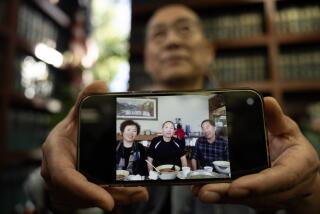Man Arrested in Nephew’s Mutilation Death
- Share via
Two and a half years after workers at a San Fernando Valley recycling center found a partial human torso and leg on a conveyor belt, Los Angeles police say they have solved the mystery.
Los Angeles Police Department detectives, who long ago determined that the body parts were those of a 35-year-old Syrian immigrant named Hilal Taweel, arrested his uncle, Fadel Tawil, at his Burbank apartment Wednesday. Tawil, who police said had a strained relationship with his nephew because of the nephew’s American ways, was charged with first-degree murder and is being held on $1-million bail.
“It took us a while to put the puzzle together,” said Det. James Gollaz. “But the puzzle fits. We believe Hilal Taweel was killed because of the embarrassment he caused.”
Police describe Tawil, 64, as a man unable to reconcile the life he led in Syria with the culture he found in the United States when he immigrated in the late 1980s. Police believe that when his then-teenage daughter Vilma exhibited an independent streak and was supported by Hilal Taweel, a UCLA graduate, Tawil grew bitter.
They say that a small amount of blood found in Tawil’s apartment links him to the vicious crime, which they theorize took place after an argument on New Year’s Day of 1999.
After Wednesday’s arrest, investigators of the LAPD’s Robbery-Homicide Division said that Tawil had threatened to harm Taweel.
What’s more, investigators say Taweel had told friends and family members that he was in danger. If anything happened to him, he told those close to him, he wanted his uncle investigated.
Taweel’s body parts were found by workers at the Community Recycling center in Sun Valley amid cardboard and newspaper destined for a landfill.
When they saw the torso, they halted the conveyor belt, searched the trash and found another body part--the leg, sliced at the knee.
The leg told a story. It had a foot with one toe twisted over another, a birth defect that eventually led detectives to the missing Taweel.
When her cousin was reported missing, Vilma Tawil, 22, told police of her history of run-ins with her parents. She said they did whatever they could to quell her independent streak. If she spent too much time in the bathroom, they would pound on the door, demanding to know why. At her job at McDonald’s, her parents called so often that her boss threatened to fire her.
In Taweel, Vilma said she found more than a trusted cousin. An engaging man with an abiding generosity, he came to the United States when he was 24 to study engineering. He learned to embrace American ways, Vilma Tawil told police. He was someone she could lean on, someone who understood why a young woman raised in America would want to slough off some of the rigid expectations demanded of her.
Occasionally Vilma Tawil would leave her home and visit her cousin at his Burbank apartment, where she would sleep on the couch and cry on his shoulder.
In August 1998, angry at finding his daughter in Taweel’s apartment, Tawil confronted the younger man. The father felt he was being disrespected and disgraced in the local Syrian community by the actions of his nephew, police contend. Vilma Tawil has said that her father hit Taweel but that the younger man refused to fight back out of respect for his uncle.
On New Year’s Day 1999, she visited Taweel, and her father went again to the apartment, this time loudly pounding on the front door, sure his daughter was there, police said. The two refused to answer, afraid of what would happen if they did, police said.
Investigators say Taweel had decided that helping her was no longer worth the trouble. He went to the uncle’s apartment twice that day to meet with him, police say. He went first for lunch with Tawil and his wife, Mouna. Then he returned to his apartment and told Vilma Tawil to stay there and watch TV. About 4 p.m., Taweel left the apartment.
Gollaz, who worked the case with Dets. Michael Whelan and Thomas Brascia, said a witness told them that Taweel went to see his uncle then. Investigators found cell phone records showing that the last call Taweel made was to his uncle’s home. They believe the call was made as Taweel drove to see his uncle.
Within hours of that call, he was dead, police say, his body cut to bits.
A check of his shoes, medical records and X-rays confirmed the identity of the remains.
Over two years, police took saliva swabs from Vilma Tawil, her father, mother and brother for DNA testing. In an interview with The Times in 1999, the suspect said detectives had accused him of the killing. “We didn’t do nothing wrong,” he insisted.
Gollaz said a lie detector test showed Tawil was deceptive when he said he didn’t know anything about the killing. Around that time, Gollaz said, detectives had found a patch of carpet in the living room that had been replaced and covered with a Persian rug. Underneath, investigators say, they found signs of blood. They returned to search again, once more finding traces of blood on a wall in the house. They say DNA tests confirmed that it was the victim’s blood.
“It has taken some time but we had some further investigation to see if there was anything more to come up with,” Deputy Dist. Atty. Craig Hum said.
*
Times staff writer Scott Glover contributed to this story.
More to Read
Sign up for Essential California
The most important California stories and recommendations in your inbox every morning.
You may occasionally receive promotional content from the Los Angeles Times.














